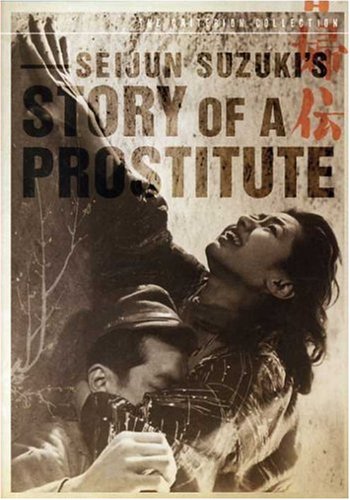
Presumably one of the string of "movies that don't make sense" that led Nikkatsu Studios to promptly fire the Japanese director following the debacle of BRANDED TO KILL and in the process turn him into an icon of Japanese cult cinema to be celebrated by the likes of Nagisa Oshima and Shohei Imamura perhaps not for what his work really was but for what it symbolized (a youthful rebellion against a studio system as rigid and oppressive as Japanese society), STORY OF A PROSTITUTE is in the same time a war melodrama, a rather conventional love story that you could see come out in Hollywood in the 50's, but also a Seijun Suzuki film.
A genre director who slaved away from b-movie to b-movie working from scripts that had little difference from one to the next, Suzuki developed, out of artistic frustration with the trappings of cookie cutter studio film-making, an irreverent visual grammar which often existed for the sake of it. In his way however, and perhaps unwittingly, he became a precursor of sorts to the Japanese New Wave of the 60's.Story of a Prostitute shows both facets of his work. A crowdpleasing genre film and a visual tour-de-force. But unlike stuff like TOKYO DRIFTER, or indeed Branded to Kill, films that often appeared to be little more than empty exercises in stylish bravura where the only reward possible for the viewer was a confirmation of Suzuki's bold, audacious approach, Story has a dramatic heart. The director approaches the love story between Mirakami, an orderly to an abusive adjutant who is brainwashed to docile acceptance of military authority, and Harumi, a passionate prostitute working a Japanese camp somewhere in Manchuria in the days of WWII, with sincerity and honesty.In the same time he punctuates the main plot with set-pieces that truly dazzle with their inventiveness. Harumi running through a shellshocked battlefield to an injured Mirakami; Harumi's fantasy of Mirakami rushing in slow-motion through a white-washed scene to save her from the abusive officer. All this filmed in stark black and white, with fast tracking shots around walls and behind wooden panels, beautiful exterior shots of Manchurian landscapes which dwarf the figures walking them, intricate framing in depth and poignant symbolic touches that give an almost existential air to proceedings.
It's true that some of Suzuki's experimentations, jarring cuts and slow motion shots, don't quite work; and it's true that the movie in the end lapses into a kind of didacticism that hasn't aged very well. But for the most part this is, not only a stunning display of visual bravado to please the art-house crowds, but also an excellent war drama that ranks among the best of the decade.
Download Links:
Rar Password: None




Δεν υπάρχουν σχόλια:
Δημοσίευση σχολίου